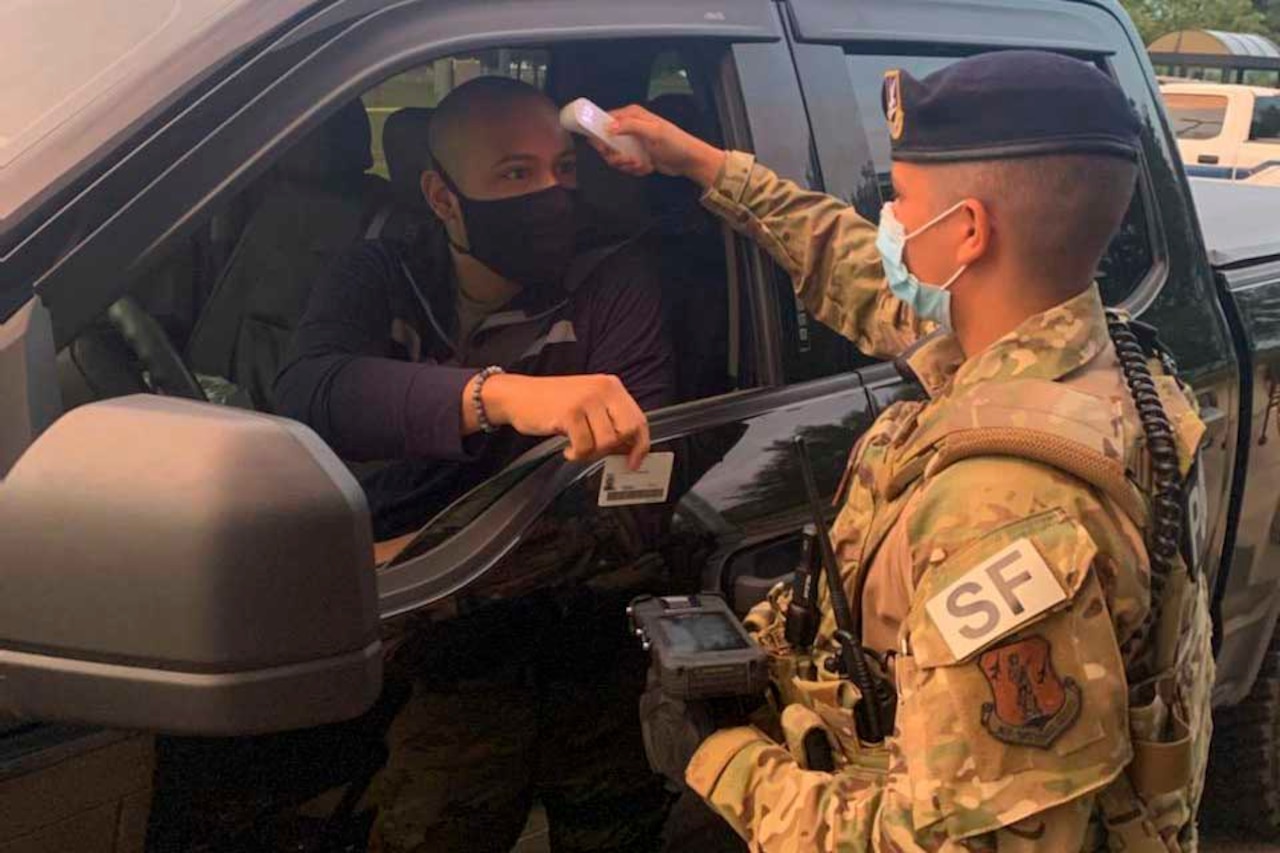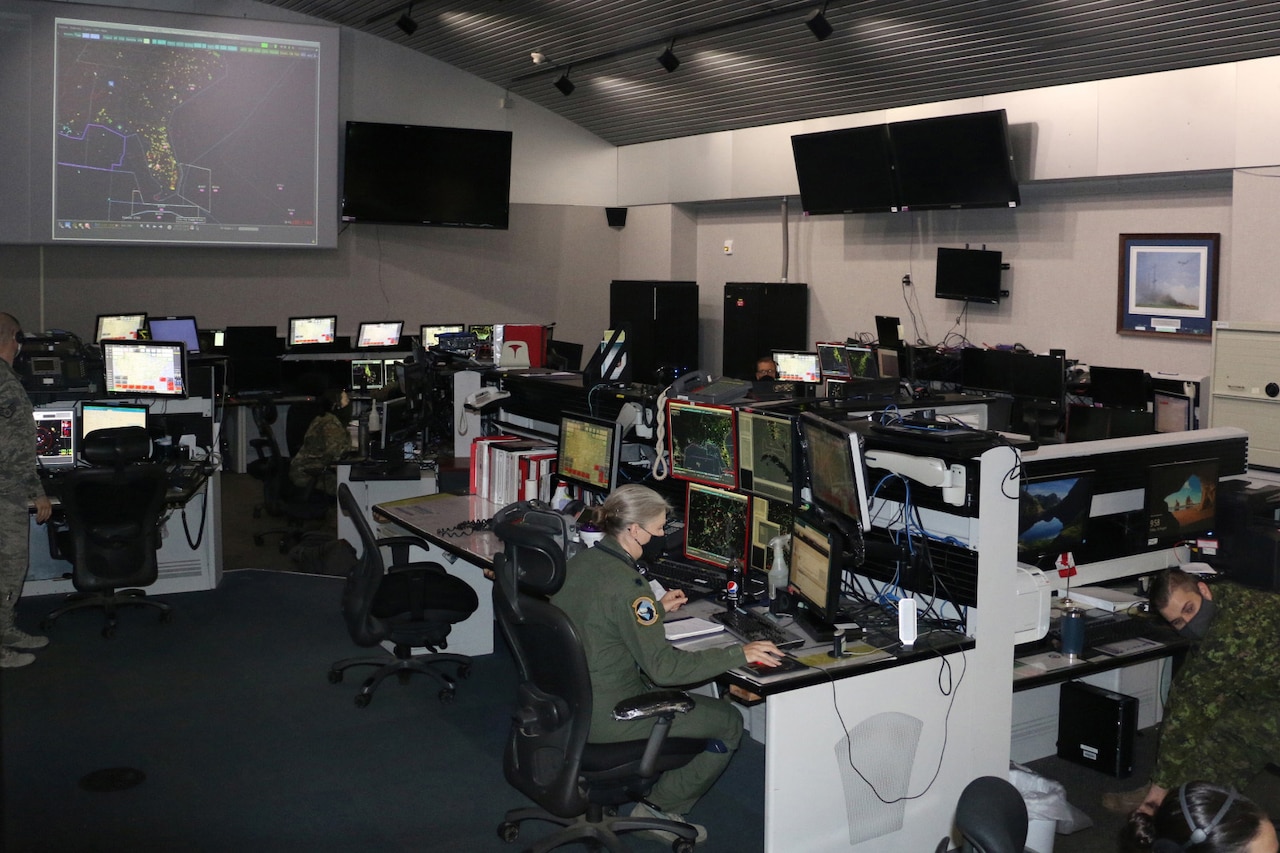Sept. 16, 2020 | , New York National Guard
The COVID-19 pandemic has forced military units both large and small to find creative ways to maintain a healthy force while still defending the nation.
One of these organizations is the 224th Air Defense Group, the New York Air National Guard unit that provides the personnel for the Eastern Air Defense Sector's federal mission.
As a headquarters element of the Continental U.S. North American Aerospace Defense Command/1st Air Force, EADS defends the area east of the Mississippi River against possible air attack. It's an all day, every day, no-fail mission.
In March, Army Maj. Gen. Raymond Shields, the New York adjutant general, ordered the state's Title 10 federal missions to continue without interruption. The 224th responded immediately. Initial efforts focused on the Battle Control Center.

An operations floor housed within a restricted facility, the BCC receives radar and communication feeds from sources across the eastern U.S. This data is used to build a constant, real-time air picture of the air traffic east of the Mississippi River.
Airmen at the BCC monitor the air picture around the clock. They determine whether a radar track is an inattentive pilot, a flock of birds or a threat.
When it could be a threat, the BCC takes action to counter it, which can include scrambling fighter aircraft.
Computers, radars and radios are key components of the BCC. The most essential component however, are healthy, well-trained airmen.
"We can't create trained air battle managers, radar technicians, and weapons and aircraft controllers overnight. And there's no place we can get them from quickly," said Air Force Col. Paul Bishop, the EADS commander. "Making sure our core operational force remains healthy is really the only way we have to achieve mission assurance."
At the pandemic's outset, a dispersion and isolation strategy was put in place.
All non-essential personnel began teleworking, reducing the transmission threat to staff on the operations floor and other vital areas.
This was reinforced by strict social distancing protocols, mandatory mask-wearing, constant reminders to wash hands and stringent equipment and facility cleaning measures.
The most labor-intensive step was re-designing the operations floor to meet social distancing guidelines. Dozens of monitors, computers and desks were rearranged or removed, and hundreds of cables and wires were re-routed.
Completed in mid-August, the re-design allows personnel to maintain six feet distance during both real-world operations and training missions.
These measures have been successful, Bishop said.
Despite New York's high COVID-19 case counts early in the pandemic, only one EADS member contracted the virus in the last six months.
"The member was exposed outside the facility and quickly recovered," Bishop added.
As the pandemic continues, commanders have responded by instituting additional protective measures.
The centerpiece of the new measures has been education, said Air Force Col. Joseph F. Roos, the commander of the 224th Air Defense Group.
"We have an intelligent work force clearly focused on remaining healthy, and it's made communicating the protective measures and continually evolving health information much easier," he said.
"We're helped by the fact that our airmen and civilian employees realize that it's not just about them," Roos added.
"Our members live in the surrounding communities. Their spouses work at local businesses, and their children attend local schools. They're invested in eliminating the spread of COVID-19 and are very receptive to the health information provided to them," he said.

Installation health screenings were implemented in June. Security personnel conduct mandatory temperature checks at the facility's gate and ensure members are healthy before allowing entry.
Virtual systems like Microsoft Teams and Zoom are used for staff meetings and drills, reducing transmission risks.
Even existing technologies, such as the ultraviolet disinfection system on the BCC's air handlers, play a role.
Installed in 2019 to reduce dust and dirt, the UV system destroys more than 99% of all airborne contaminants, including viruses, providing an unseen layer of defense in the mission assurance battle.
"Technology has been very helpful," Roos said. "It's enhanced our operation in several areas, but the fundamentals are still the fundamentals, and we stress them every day: wear your mask, stay six feet apart, wash your hands and only come to the office when it's necessary."
It was apparent early on that the "isolation and dispersion" strategy could wreak havoc on the ADG's morale and mental health, Bishop said.
For airmen used to working long shifts shoulder-to-shoulder on a crowded operations floor and in small offices, the sudden switch to limited manning was jarring, he said.
"It was evident from the start that one of our biggest challenges was keeping our airmen connected," Bishop said. "It's hard. Nothing replaces in-person communication, but we've taken multiple steps to let our people know they are not alone."
To boost morale, the ADG has continued with virtual promotions and awards events, broadcasting them online so members can celebrate the successes of their fellow airmen.
The unit has also hosted a series of online social events, such as the traditional first Friday gatherings.
These efforts have been augmented by the careful management of manpower to limit fatigue. Leaders at all levels have also made it a point to constantly remind staff of the air defense mission's importance and the importance of each airman.
"We've successfully navigated the last six months and provided the mission assurance our leaders demand and the nation requires," Bishop said. "Our effort has been successful because our airmen and civilians have done everything necessary to keep us safe and healthy."








No comments:
Post a Comment